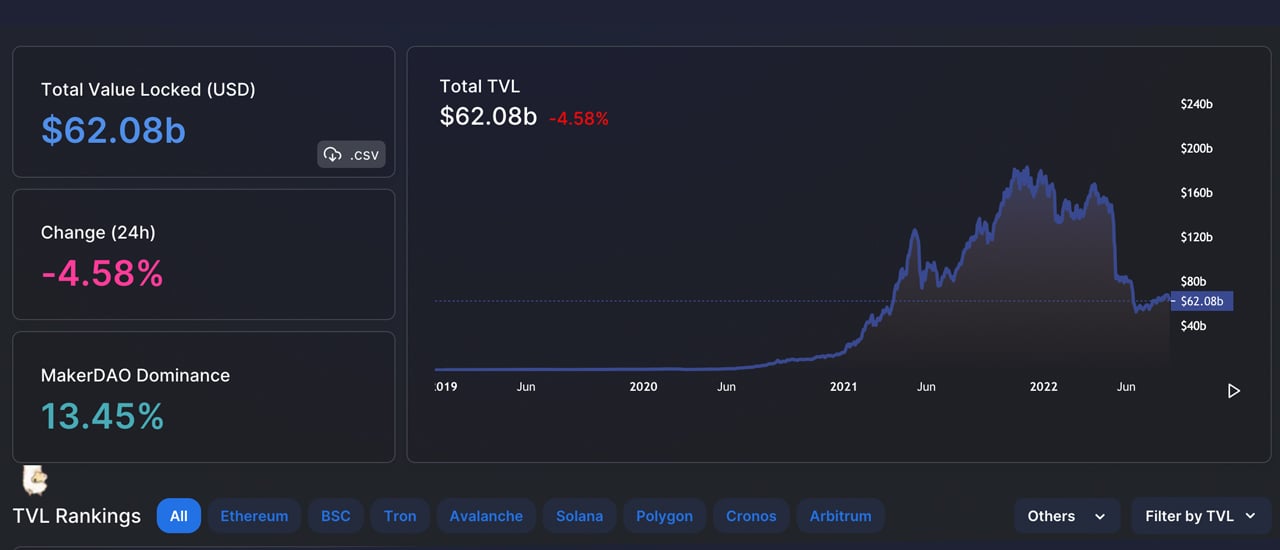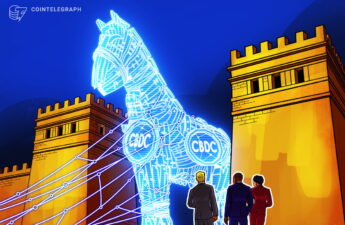The total value locked (TVL) in decentralized finance (defi) has slid 8.53% over the last five days since August 14, 2022. At the time, the TVL was $67.87 billion but today, the value locked in defi is approximately $62.08 billion. Moreover, the top smart contract platform tokens by market valuation today are worth $372 billion, but overall the dozens of smart contract crypto assets have lost 7.8% in value during the last 24 hours.
Smart Contract Token Economy Slides Lower, Total Value Locked in Defi Loses 8.53% Since August 14
On August 19, 2022, the top smart contract tokens like ethereum (ETH), binance coin (BNB), cardano (ADA), solana (SOL), polkadot (DOT), and avalanche (AVAX) are all down in value against the U.S. dollar. There are dozens of smart contract tokens and collectively they are all worth $347 billion, down 7.8% according to today’s market data.
Ethereum leads the pack with the largest market capitalization as ETH now commands 19.2% of the crypto economy’s $1.14 trillion in value. Out of the entire lot of smart contract coins worth $347 billion, ETH’s $208 billion market cap represents 59.94% of the top smart contract tokens by valuation.

At the same time, the smart contract crypto economy equates to roughly 32.12% of the crypto economy’s $1.08 trillion valuation. While the top smart contract tokens’ market performances have been lackluster, the value locked in defi has been the same. Today there’s $62.08 billion in value locked into the numerous defi protocols in existence and defillama.com stats detail the protocol Makerdao dominates by 13.45%.

Data shows that the defi protocol Makerdao’s TVL on August 19, is around $8.35 billion. Following Makerdao’s TVL, today’s top defi protocols by TVL include Lido ($7.62B), Aave ($6.91B), Curve Finance ($5.98B), Uniswap ($5.88B), Convex Finance ($4.32B), and Justlend ($3.27B). In terms of the blockchain with the largest TVL metric, Ethereum is still the reigning champ with $36.31 billion or 59.04% of the TVL in defi.
Ethereum is followed by Tron, Binance Smart Chain, Polygon, Avalanche, Solana, Cronos, Arbitrum, Optimism, and Fantom, respectively. In comparison to Ethereum, the second-largest blockchain by defi TVL metrics, Tron, commands $5.63 billion or 9.15% of the $62.08 billion locked in defi protocols today.
While the tenth-largest blockchain by defi TVL data, Fantom, has around $588 million or 0.96% of the TVL in defi, Justlend is the largest defi protocol on the Tron network as it dominates by 58.14% of the network’s $5.63 billion locked in defi, or $3.27 billion in USD value. Binance Smart Chain’s largest defi protocol is Pancakeswap, Polygon’s is MM Finance, Avalanche’s largest is Aave, and Solana’s is Marinade Finance.
With Ethereum being the top defi chain, the network’s top collateralized debt position (CDP) protocol is Makerdao, the biggest liquid staking application is Lido, and Uniswap rules the roost in terms of Ethereum decentralized exchange (dex) platforms. Aave is Ethereum’s largest lending application, the WBTC bridge has the most value locked, and Convex Finance is Ethereum’s top yield protocol in terms of TVL.
Tags in this story
Aave, Binance Smart Chain, convex finance, Cross-chain Bridges, Curve, decentralized finance, decentralized finance protocols, DeFi, Defi metrics, defi records, defi stats, ether, Ethereum, Ethereum (ETH), Instadapp, Justlend, Lido, makerdao, Marinade Finance, Market Dominance, MM Finance, Pancakeswap, Smart Contract, smart contract platform coin, tron, TVL
What do you think about this week’s decentralized finance market action and the value locked in these protocols? Let us know what you think about this subject in the comments section below.
![]()
Jamie Redman
Image Credits: Shutterstock, Pixabay, Wiki Commons
Disclaimer: This article is for informational purposes only. It is not a direct offer or solicitation of an offer to buy or sell, or a recommendation or endorsement of any products, services, or companies. Bitcoin.com does not provide investment, tax, legal, or accounting advice. Neither the company nor the author is responsible, directly or indirectly, for any damage or loss caused or alleged to be caused by or in connection with the use of or reliance on any content, goods or services mentioned in this article.



